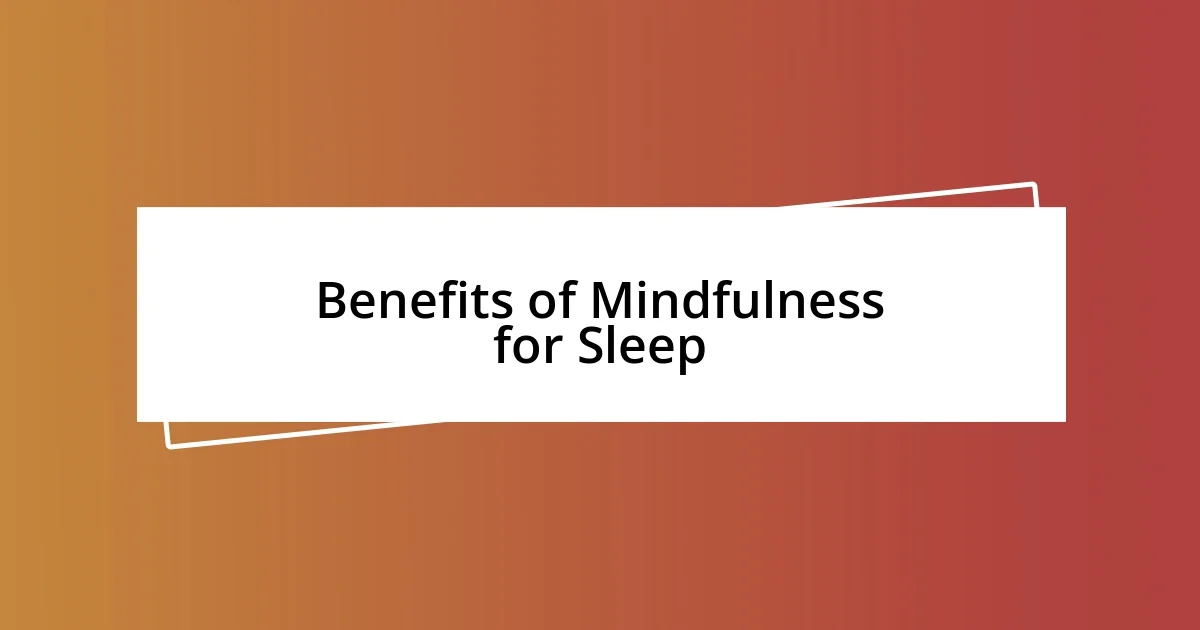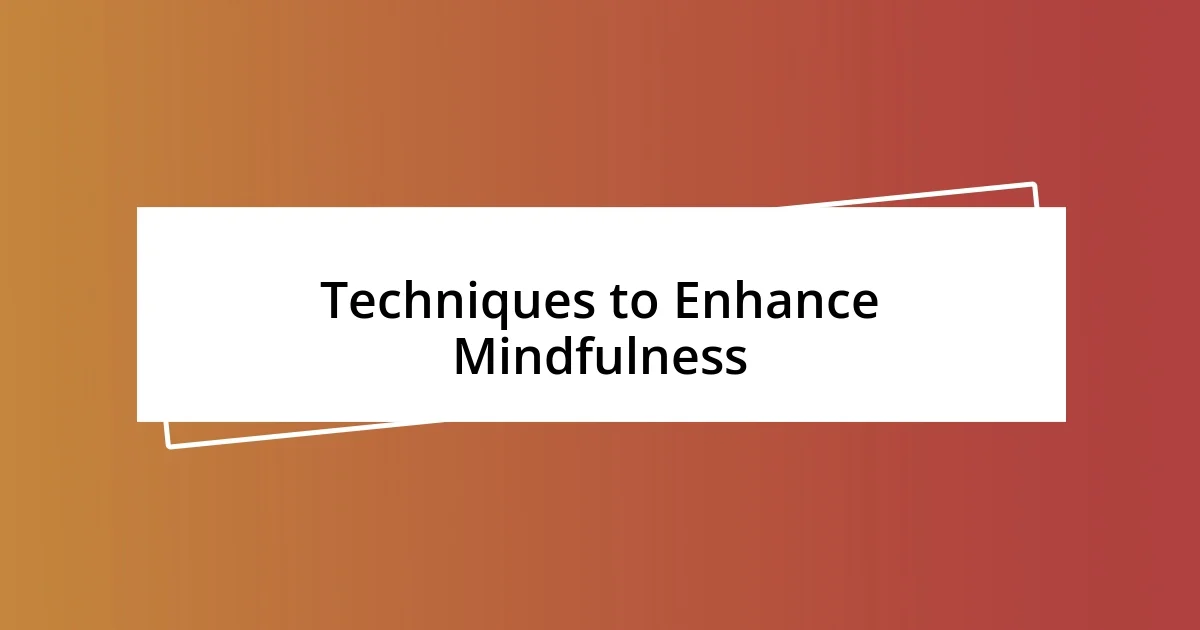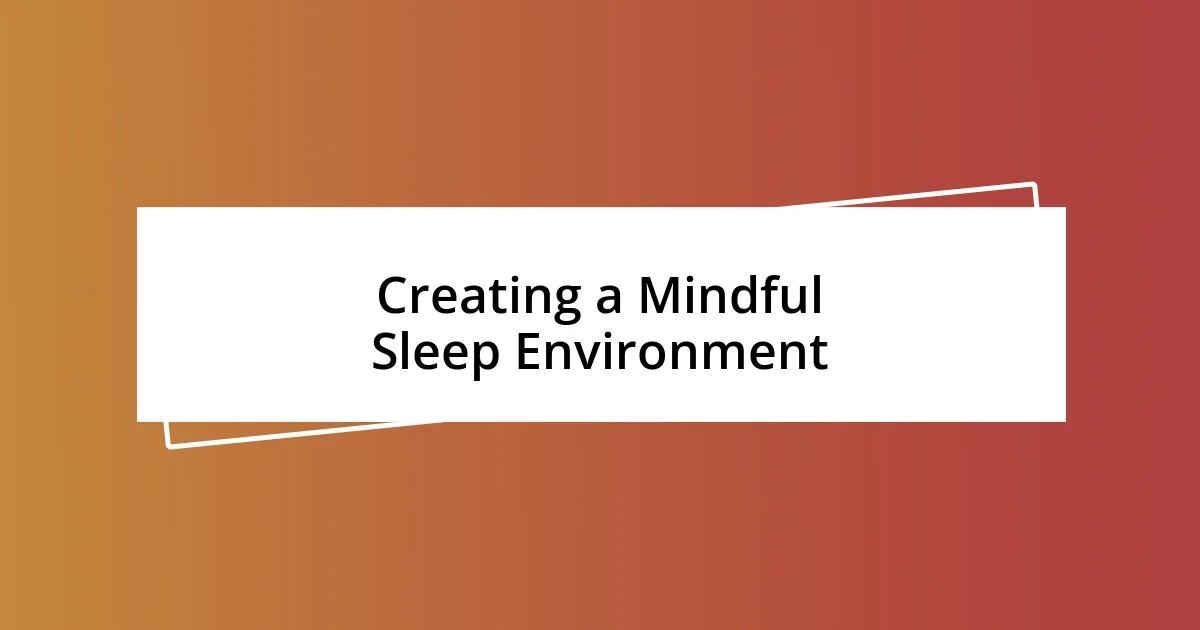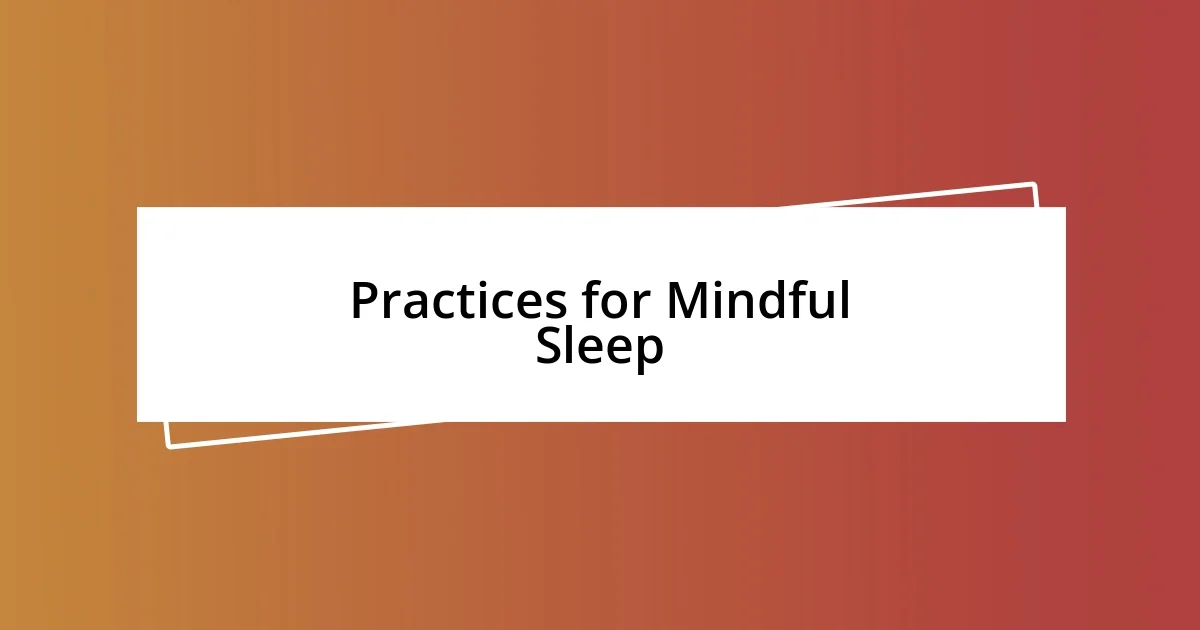Key takeaways:
- Incorporating mindfulness techniques like gratitude reflection and mindful breathing can significantly enhance sleep quality and reduce anxiety.
- Creating a calming sleep environment by decluttering, adjusting lighting, and incorporating soothing scents promotes relaxation and a better night’s sleep.
- Tracking sleep progress through journaling and adapting routines encourages mindfulness and helps identify effective practices for improved sleep experiences.

Understanding Mindfulness in Sleep
Mindfulness in sleep is about being fully present with your thoughts and feelings as you drift off. I remember a night when I felt a wave of anxiety wash over me, and instead of resisting it, I acknowledged it. By focusing on my breath and accepting those feelings, I could calm my mind, transforming a potentially restless night into one of deep relaxation.
Have you ever found yourself tossing and turning, your mind racing with the events of the day? That was a familiar scenario for me. Once I started practicing mindfulness, I discovered that observing those racing thoughts without judgment made a world of difference. It’s like watching leaves float by in a stream; I learned not to grab hold of them but to let them pass peacefully.
When I began incorporating mindfulness into my bedtime routine, it felt as if I was reconnecting with myself. I found that simple practices, like body scanning or focused breathing, allowed me to appreciate the moment rather than worrying about tomorrow. Each night became a soothing ritual—a chance to embrace stillness and cultivate gratitude for the day’s experiences.

Benefits of Mindfulness for Sleep
The advantages of practicing mindfulness for sleep are both profound and transformative. I experienced a marked reduction in the restless thoughts that used to plague my nights. Now, I find that by focusing on the present moment, I’m not only more relaxed but also able to enjoy deeper and more restorative sleep. Each night, as I let go of the day’s stressors, I feel a sense of peace enveloping me like a warm blanket, cradling me into restful slumber.
Here are some notable benefits I’ve observed firsthand:
- Decreased Anxiety: Mindfulness helps quiet my racing thoughts, allowing me to feel calm and centered before sleep.
- Enhanced Sleep Quality: I’ve noticed I wake up feeling more refreshed, with less grogginess and better overall rest.
- Increased Self-Awareness: Regular mindfulness practice encourages me to recognize my sleep patterns and adjust them for better rest.
- Strengthened Resilience: I find that dealing with stressors is easier when I’m grounded in the present, leading me to worry less at night.
- Improved Emotional Regulation: With mindfulness, I feel more equipped to handle emotions that surface during the night, which might otherwise keep me awake.
Embracing mindfulness has truly changed the way I approach sleep, turning what was once a source of frustration into a sanctuary for relaxation and renewal.

Techniques to Enhance Mindfulness
Incorporating mindfulness into my sleep routine has involved various techniques that really helped me deepen my experience. One of my favorites is practicing gratitude before bed. I take a moment to reflect on three things I appreciated that day. This simple act warms my heart and creates an intimate connection to my day, easing me into a more peaceful state of mind.
Another technique that I find powerful is mindful breathing. I often visualize each breath as a wave washing over me, carrying away my worries as I exhale. This visualization not only calms my racing thoughts but also helps me focus on the present moment. There’s something undeniably soothing about just being with my breath, allowing it to guide me into a calm slumber.
Lastly, I’ve experimented with guided imagery. Listening to a calming voice take me on a journey through serene landscapes cultivates a sense of escape from daily stressors. It’s like taking a mini-vacation in my mind. I remember nights when the world felt chaotic, and through this technique, I would gently drift away, leaving behind my worries for a while.
| Technique | Description |
|---|---|
| Gratitude Reflection | Reflecting on three positive events from the day fosters positivity and eases stress. |
| Mindful Breathing | Focusing on the breath creates a calming rhythm that promotes relaxation. |
| Guided Imagery | Listening to calming narratives transports the mind to peaceful places, easing anxiety. |

Creating a Mindful Sleep Environment
Creating a mindful sleep environment starts with my bedroom setup. I’ve learned that minimizing distractions is crucial. The first step I took was to declutter my space; I remember the difference it made. A tidy room feels so much more inviting and calming, doesn’t it? I didn’t just remove physical clutter; I also turned off electronic devices an hour before bed to keep my mind from racing.
Lighting plays a pivotal role in setting the right atmosphere. Soft, dim lights can create a cozy haven. I switched to warm-toned bulbs, and it instantly transformed the feeling of my room. There’s a gentle tranquility in those golden hues that help me prepare for sleep. I also invested in blackout curtains to block out harsh outside light, which made a world of difference.
A key element in maintaining my mindful sleep environment is incorporating calming scents. I introduced lavender essential oil into my evening routine, often diffusing it right before bed. The aroma envelops me, soothing my mind and body. Have you ever noticed how your surroundings can influence your state of mind? For me, those sweet scents act like a gentle invitation to relax, pulling me further away from the chaos of the day and into a peaceful slumber.

Establishing a Nighttime Routine
To establish a nighttime routine, I found that consistency is key. I began by setting a specific bedtime each night, which surprisingly helped my body recognize when it was time to wind down. It’s interesting how our internal clocks can adapt when given the right signals, making falling asleep feel almost natural. Have you ever noticed how you sleep better when you maintain a steady schedule?
I also prioritized creating a relaxing pre-sleep ritual. For me, this meant stepping away from screens and diving into a good book or practicing gentle stretches. One memorable evening, as I let my eyes drift across the pages, I felt the day’s stress slowly fade away. It’s as if the words acted as a bridge to a more peaceful state of mind, allowing me to leave behind the busyness of the day.
Lastly, I realized the importance of gentle transitions in my routine. I began to dim the lights and play soft music about 30 minutes before bed. This simple change transformed my environment into a serene oasis, helping me let go of lingering thoughts. Do you ever find that a change in ambiance can shift your mood? I sure do; it’s as if setting the right tone prepares not just my space but my mind for a restorative sleep.

Practices for Mindful Sleep
One practice I found particularly transformative for mindful sleep is incorporating breathwork into my routine. Before bed, I sit in a comfortable position and focus on inhaling deeply and exhaling slowly. I remember the first time I did this; it felt as if I was melting into my bed, released from the pressures of the day. Have you ever tried simply listening to your breath? It can be a grounding experience that helps clear your mind, enabling a deeper sense of relaxation.
Journaling before sleep has also become a crucial part of my nightly routine. I’ve started writing down my thoughts, detailing my day’s challenges and celebrating small victories. One night, as I penned down a moment I cherished, I felt an overwhelming sense of gratitude wash over me. Isn’t it fascinating how reflecting on positive moments can shift your mindset? By transferring my thoughts to paper, I release the day’s worries and make space for serenity, allowing my mind to settle more easily into sleep.
Lastly, practicing gentle yoga has played a significant role in enhancing my mindful sleep. I dedicate a few minutes each night to flow through simple poses focused on relaxation. One evening, as I transitioned from a forward fold to a child’s pose, I felt a wave of calmness enveloping me, almost as if my body was preparing for rest. Isn’t it incredible how physical movement can soothe the mind? This practice not only stretches my body but also quiets my thoughts, laying the foundation for peaceful slumber.

Tracking Progress and Adjustments
Tracking my progress with mindfulness in sleep was a journey in itself. I started by keeping a sleep journal, noting how I felt each morning after a different pre-sleep practice. One morning, after a night filled with breathwork and journaling, I woke up feeling lighter and more refreshed. I couldn’t help but wonder: was it the journaling that did it, or was it simply the act of reflecting? This led me to realize the importance of monitoring not just the hours I slept, but also the quality of those hours.
As I adjusted my routine, I learned that flexibility is key. I experimented with different breathing techniques and adjusted my bedtime based on my energy levels. For instance, one night I simply felt too restless for my usual practices, so I opted for soothing music instead. The next morning, I smiled at how that spontaneous choice led to a surprisingly deep sleep. I started asking myself—how do I adapt when things don’t go as planned? This insight helped me embrace spontaneity in my routine, allowing me to stay mindful even when faced with unexpected challenges.
I also began reviewing my sleep patterns weekly, noting which practices yielded the best results. I discovered that nights spent reading left me feeling more relaxed than those spent scrolling through my phone. Realizing this prompted a shift in my choices. Reflecting on my journey, I can confidently say that tracking my progress transformed my approach to sleep. It helped me curate a mindful experience tailored to my unique needs. What methods have you tried to track your own progress in cultivating mindfulness?













